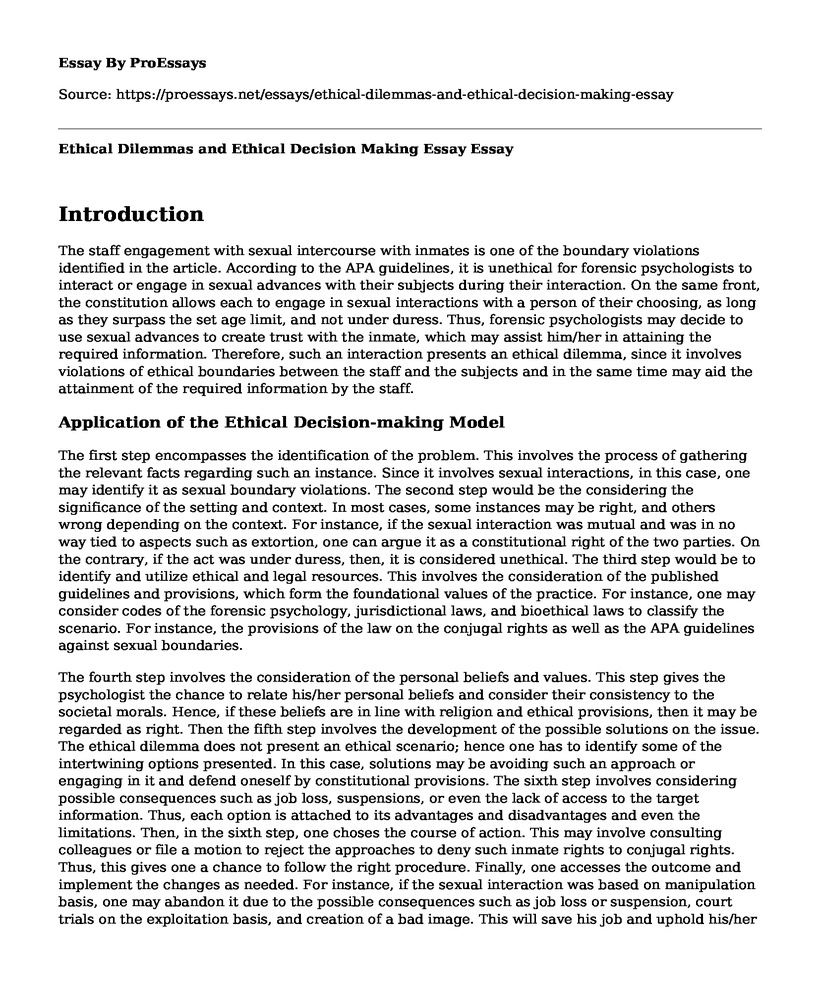Introduction
The staff engagement with sexual intercourse with inmates is one of the boundary violations identified in the article. According to the APA guidelines, it is unethical for forensic psychologists to interact or engage in sexual advances with their subjects during their interaction. On the same front, the constitution allows each to engage in sexual interactions with a person of their choosing, as long as they surpass the set age limit, and not under duress. Thus, forensic psychologists may decide to use sexual advances to create trust with the inmate, which may assist him/her in attaining the required information. Therefore, such an interaction presents an ethical dilemma, since it involves violations of ethical boundaries between the staff and the subjects and in the same time may aid the attainment of the required information by the staff.
Application of the Ethical Decision-making Model
The first step encompasses the identification of the problem. This involves the process of gathering the relevant facts regarding such an instance. Since it involves sexual interactions, in this case, one may identify it as sexual boundary violations. The second step would be the considering the significance of the setting and context. In most cases, some instances may be right, and others wrong depending on the context. For instance, if the sexual interaction was mutual and was in no way tied to aspects such as extortion, one can argue it as a constitutional right of the two parties. On the contrary, if the act was under duress, then, it is considered unethical. The third step would be to identify and utilize ethical and legal resources. This involves the consideration of the published guidelines and provisions, which form the foundational values of the practice. For instance, one may consider codes of the forensic psychology, jurisdictional laws, and bioethical laws to classify the scenario. For instance, the provisions of the law on the conjugal rights as well as the APA guidelines against sexual boundaries.
The fourth step involves the consideration of the personal beliefs and values. This step gives the psychologist the chance to relate his/her personal beliefs and consider their consistency to the societal morals. Hence, if these beliefs are in line with religion and ethical provisions, then it may be regarded as right. Then the fifth step involves the development of the possible solutions on the issue. The ethical dilemma does not present an ethical scenario; hence one has to identify some of the intertwining options presented. In this case, solutions may be avoiding such an approach or engaging in it and defend oneself by constitutional provisions. The sixth step involves considering possible consequences such as job loss, suspensions, or even the lack of access to the target information. Thus, each option is attached to its advantages and disadvantages and even the limitations. Then, in the sixth step, one choses the course of action. This may involve consulting colleagues or file a motion to reject the approaches to deny such inmate rights to conjugal rights. Thus, this gives one a chance to follow the right procedure. Finally, one accesses the outcome and implement the changes as needed. For instance, if the sexual interaction was based on manipulation basis, one may abandon it due to the possible consequences such as job loss or suspension, court trials on the exploitation basis, and creation of a bad image. This will save his job and uphold his/her reputation in the society. Thus, the selection is based on the possible outcomes rather than ethical provisions.
Cite this page
Ethical Dilemmas and Ethical Decision Making Essay. (2022, Jun 19). Retrieved from https://proessays.net/essays/ethical-dilemmas-and-ethical-decision-making-essay
If you are the original author of this essay and no longer wish to have it published on the ProEssays website, please click below to request its removal:
- The School and Community Relations
- Paper Example on Business Analytics in Product Management
- Social Structures of Japan Essay Example
- Essay Example on Coca-Cola: Examining Its Global Environment & Economic Trends
- Children and Divorce: Effects and Protection - Research Paper
- Paper Example on Employee Rights & Responsibilities: Privileges, Obligations & Ethical Treatment
- Essay Example on Employees' Rights: Equal & Just Treatment, Safer Workplace, Liberty from Retaliation







